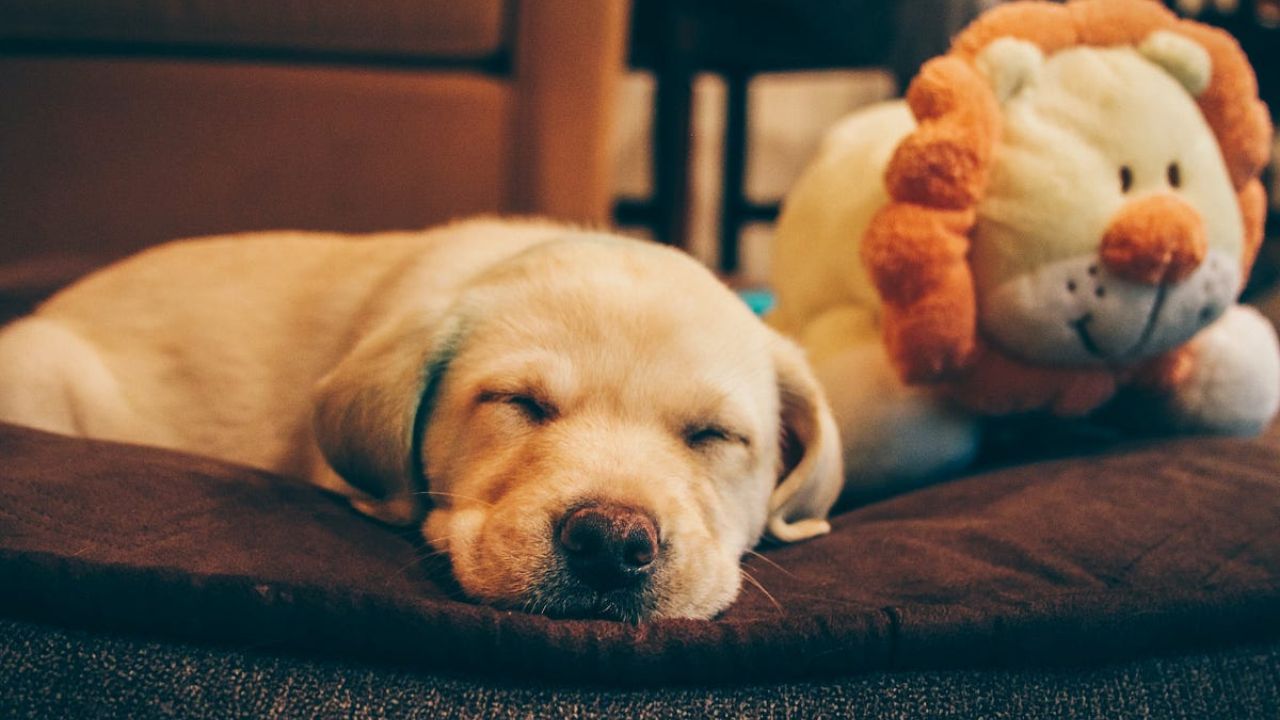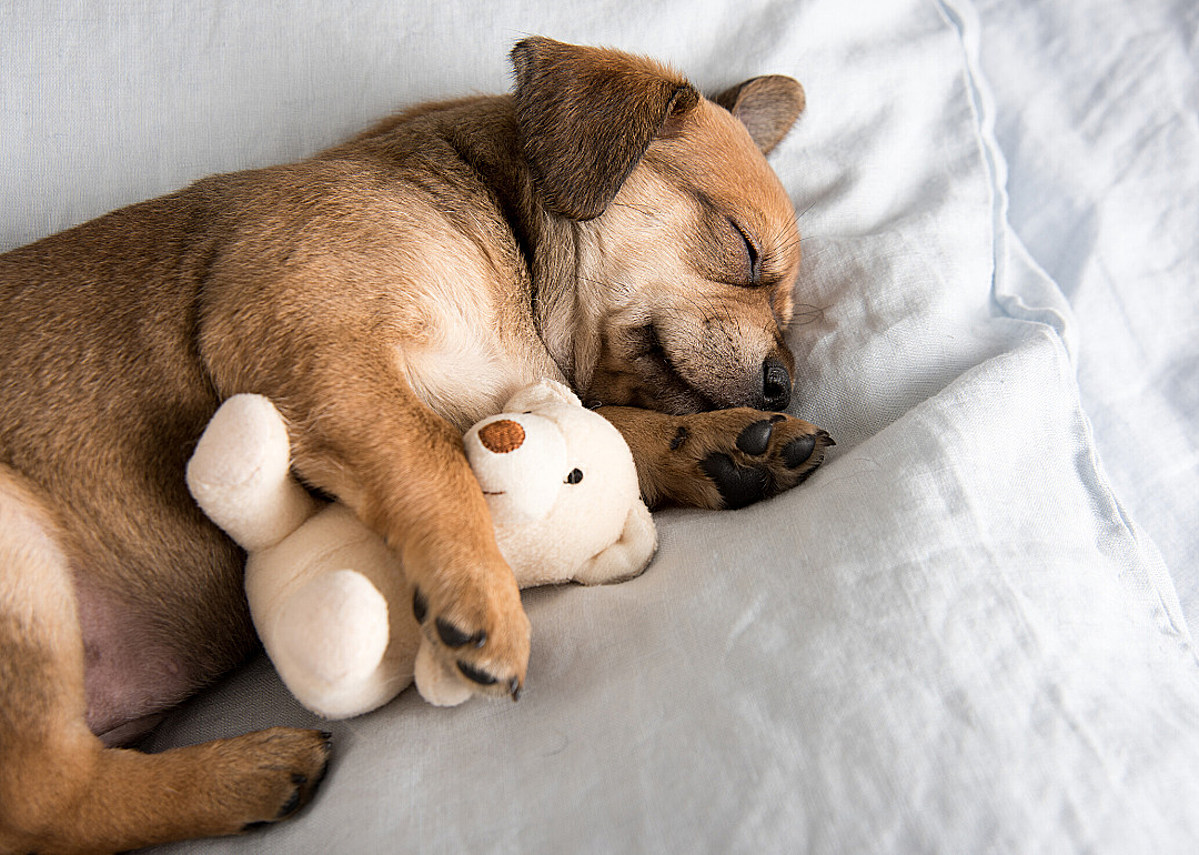
Puppies are adorable bundles of energy during the day, but when the sun sets, it’s time for them to recharge their batteries. As a pet owner, understanding how long your puppy should sleep at night is crucial for their well-being and your peace of mind. Let’s delve into the fascinating world of puppies sleep at night to ensure both you and your furry friend enjoy restful nights.
Welcoming a new puppy into your home is an exciting experience, but it comes with the challenge of navigating their sleep patterns. Puppies, like human babies, need plenty of sleep for optimal development. The key is understanding their unique needs and creating an environment that promotes healthy sleep.
The Science Behind Puppy Sleep
Puppies, especially younger ones, require more sleep than adult dogs. The amount of sleep they need varies depending on their age. As they mature, newborn puppies’ 22 hours of sleep per day eventually decrease. Sleep is essential for their growth and learning, as well as for their physical and mental development.
Factors Influencing Puppy Sleep

Factors affecting the sleep patterns of puppies are diverse and can significantly impact their overall well-being. These influential elements range from breed-specific characteristics to environmental conditions. Understanding the breed differences in sleep tendencies is crucial, as certain breeds may have distinct patterns. Additionally, environmental factors, such as the noise level and activity within a household, play a pivotal role in determining a puppy’s ability to settle down for the night.
Creating an awareness of these influences empowers pet owners to tailor their approach, ensuring a comfortable and conducive sleep environment for their furry companions. By addressing these factors, one can promote healthier and more restful sleep for puppies, contributing to their overall development and happiness..
Creating a Comfortable Sleep Environment
Ensuring your puppy’s peaceful slumber involves crafting an ideal sleep haven. “Creating a Comfortable Sleep Environment” is about more than just a cozy bed; it’s a holistic approach to optimizing your furry friend’s rest. Picture a serene space with soft, inviting bedding tailored to your puppy’s preferences. Consider the ambient temperature and gentle lighting, fostering an atmosphere conducive to deep, rejuvenating puppies sleep at night.
By thoughtfully curating their sleep surroundings, you contribute to their overall well-being, promoting not just physical comfort but also mental tranquility. This crucial step in puppy care sets the stage for restful nights and happy, energized days, reinforcing the bond between you and your four-legged companion.
Establishing a Bedtime Routine
Creating a bedtime routine for your puppy is a crucial aspect of ensuring restful nights and promoting overall well-being. This process involves setting consistent and calming activities that signal to your furry friend that it’s time to wind down. By incorporating a short walk, engaging in quiet play, and providing a bathroom break before bedtime, you establish a predictable pattern that helps your puppy transition into a restful sleep.
This routine not only aids in physical relaxation but also contributes to mental preparation for a night of uninterrupted rest. The bedtime routine becomes a comforting ritual for your puppy, fostering a sense of security and structure essential for their development.
Common Sleep Issues and Solutions
When it comes to our furry companions, sleep issues are not uncommon, and addressing them promptly is crucial for their well-being. Puppies, like humans, can experience difficulties such as night waking, restlessness, or whining during sleep. These issues can be attributed to various factors, including environmental changes, discomfort, or even developmental stages.
As a responsible pet owner, it’s essential to be aware of these common sleep challenges and, more importantly, to have effective solutions at your disposal. This section will delve into the typical sleep problems your puppy might encounter and provide practical solutions to ensure both you and your four-legged friend enjoy peaceful nights.
Puppy Sleep Training Techniques
Just like any training, teaching your puppy good sleep habits requires patience and positive reinforcement. Consistency is key, and avoiding punishments is crucial to building a trusting relationship with your furry companion.
Balancing Playtime and Rest
Achieving a harmonious balance between playtime and rest is crucial for the overall well-being of your puppy. This key aspect of canine care involves understanding the delicate equilibrium between physical activity and relaxation. Providing ample playtime is essential for your puppy’s mental stimulation, social development, and the release of pent-up energy. However, striking the right balance is equally important, as overexertion can lead to fatigue and restless nights.
By incorporating structured play sessions into your puppy’s daily routine and ensuring they have sufficient time for rest and recovery, you contribute to their physical health, emotional happiness, and a consistent sleep pattern. This delicate balance fosters a happy and contented puppy, promoting not only their physical development but also a calm and restful demeanor.
Developmental Milestones
“Developmental milestones” refer to significant achievements or abilities that individuals typically reach at various stages of their lives. These milestones encompass physical, cognitive, social, and emotional advancements that mark key points in a person’s growth and maturation. In the context of child development, these milestones include critical events such as crawling, walking, speaking first words, and forming social connections.
Monitoring developmental milestones is crucial for parents, caregivers, and educators as it provides insights into a child’s progress and helps identify potential areas of concern. By recognizing and supporting these milestones, individuals can ensure a holistic approach to nurturing healthy and well-rounded development in children.
Health Considerations
If your puppy’s sleep patterns suddenly change or if you notice signs of discomfort during sleep, it’s essential to consider potential health issues. Regular veterinary check-ups are crucial to address any health concerns that may impact their sleep.
Puppy Sleep Myths Debunked
Separating fact from fiction is essential in providing the best care for your puppy. Common myths about puppy sleep, such as the belief that they can sleep through the night immediately, can lead to unrealistic expectations. Providing accurate information ensures a better understanding of your puppy’s needs.
Socialization and Sleep
Ensuring a harmonious relationship between socialization and sleep is paramount in fostering a healthy and well-adjusted puppy. Puppies, much like humans, require a delicate balance between social interactions and adequate rest for their overall well-being. While socialization is crucial for their developmental milestones, an excess of stimulating activities can disrupt their sleep patterns.
Pet owners need to navigate this delicate equilibrium, allowing their furry companions the opportunity to engage in positive social experiences without compromising the quality of their sleep. By striking the right balance, pet owners can contribute to the emotional resilience and behavioral development of their puppies, creating a foundation for a happy and well-rested life.
Monitoring and Adjusting Sleep Patterns
In the realm of puppy care, the keyword “Monitoring and Adjusting Sleep Patterns” embodies the delicate art of ensuring your furry companion enjoys restful nights. Vigilance and adaptability are paramount as you observe your puppy’s sleep behavior, understanding that each pup is unique. This practice involves keen attention to signs of discomfort, restlessness, or changes in sleep duration.
By consistently monitoring these patterns, you gain valuable insights into your puppy’s evolving needs. The key lies not only in observation but also in the proactive adjustment of sleep environments or routines. This approach, personalized to your puppy’s individuality, fosters an environment where quality sleep becomes a cornerstone of their overall well-being and development.
Conclusion
In conclusion, understanding how long puppies sleep at night involves a combination of science, observation, and a touch of patience. By creating a conducive sleep environment, establishing a consistent routine, and addressing any issues promptly, you can ensure your puppy enjoys rest.
FAQ
How Many Hours Should a Puppy Sleep at Night?
Puppies, much like human infants, require ample sleep for their growth and development. On average, a puppy should ideally sleep between 12 to 16 hours at night. The specific duration can vary based on factors such as the puppy’s age, breed, and individual needs. It’s crucial to recognize that younger puppies, especially newborns, may need more extended periods of sleep, often up to 18 to 20 hours per day.
Why Does My Puppy Whine at Night?
Whining can be due to various reasons, including discomfort, loneliness, or a need for a bathroom break.
When Can I Expect My Puppy to Sleep Through The Night?
Most puppies can sleep through the night by the age of 16 weeks, but individual variations exist.
Is it Normal For My Puppy to Twitch or Move During Sleep?
Yes, it’s normal for puppies to experience rapid eye movement (REM) sleep, leading to twitching or movement.
Should I Wake My Puppy Up During The Day to Prevent Waking it Up at Night?
While short naps during the day are normal, avoid waking your puppy abruptly, as it can disrupt their sleep cycle.








